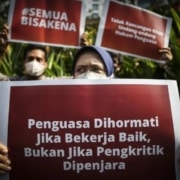
Indonesia’s Constitutional Court ruled to preserve Indonesia’s open list electoral system on 15 June.
Photo by Charles Wiriawan from Flickr.
The most important feature of democracy is the right of citizens to choose the people who exercise government power through electoral processes. These electoral processes are inherently competitive.
But can a democratic system be too competitive? Indonesia’s current open list electoral system not only requires candidates to compete against candidates from different political parties – but also those from their own party. The result is a complex general election reminiscent of The Hunger Games, which promotes fierce competition between every candidate. A recent decision of the Indonesian Constitutional Court on 15 June 2023 confirmed the 2024 election will continue to use this open list proportional system.
Prior to the 2004 general elections, Indonesia followed a closed list system of proportional representation voting where the leaders of political parties had the power and authority to determine their own list of candidates. This meant that candidates were elected according to their pre-stated position on this list – if a party won four seats, the first four candidates on that list took the seats.
A vote for a particular party was read as an endorsement of their list. Voters had very little input into the arrangement of the list. It was common practice in the past for candidates to lobby party leaders to secure the top spot on the list – this maximised their chances of getting elected, while candidates at the bottom of the list faced tougher odds.
However, in 2004, Indonesia changed its electoral system to offer an open list system.
This ensured that during the last four general elections – 2004, 2009, 2014, and 2019 – voters were allowed to choose a particular individual from a list of candidates. Under this system, members of the legislature are more accountable to the voters instead of the party.
But this increased accountability has a cost. The open system has upped the stakes and led to merciless competition between candidates from the same party. This has led to expensive general elections and campaigns where candidates must spend millions to billions of rupiah to win over voters. The price of electoral participation has escalated compared to the days of the closed system, where candidates only had to pay or otherwise please party leaders to get to the top of the list. The financial cost of participating in Indonesian elections is now a major barrier for candidates without deep pockets.
The court believes that open list proportional representation is not the root cause of money politics. The court stated that improvements to the Indonesian election system could occur in several areas beyond changing the election system itself, such as by reforming the political culture, raising voter awareness of candidates, and strengthening internal political party processes.
In my view, the closed list system needs due consideration. It can work well if political parties have democratic and transparent processes for determining their list of candidates. Sadly, most Indonesian political parties are dominated by leaders from elite family backgrounds and their close allies, and so candidate lists are not determined through open and democratic internal processes. In its current format, Indonesian democracy is already dead in the hands of party leaders.
But is the open list system the answer? The court has limited authority to reform the system – it can only reject or accept applications to revise the system. It is the task of legislature to review the system and suggest alternatives that allow for greater transparency around the selection of candidates, while restricting the corrosive influence of money politics.
Competition is an important feature of democracy. But a highly competitive democracy is not necessarily a highly effective democracy. Some political scientists believe too much competition can fuel polarisation and government instability and, in the Indonesian context, money politics.
After the 2024 election, Indonesia needs to have a serious conversation about electoral reform. But for now, Indonesia will prepare again for The Hunger Games.


 https://www.flickr.com/photos/shanghaidaddy/3296581934/in/photolist-aJfZwZ-62iQXy-4MJe21-4MUkf7-SYH2jw
https://www.flickr.com/photos/shanghaidaddy/3296581934/in/photolist-aJfZwZ-62iQXy-4MJe21-4MUkf7-SYH2jw







